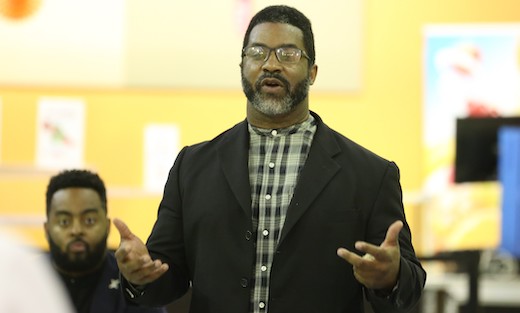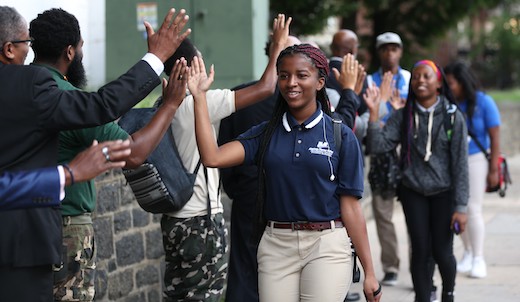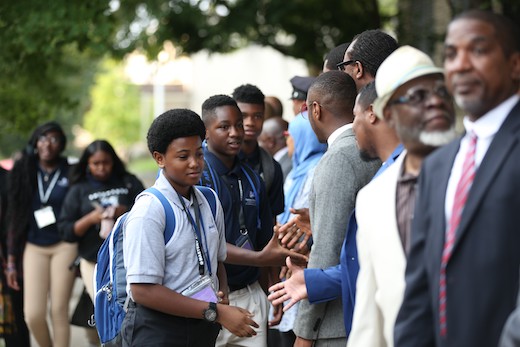Sharif El-Mekki: Leading with Equity and Justice in Education
By NNPA | Last updated: Oct 15, 2019 - 4:14:10 PMWhat's your opinion on this article?

(NNPA)—This time last year, Sharif El-Mekki, former principal of Mastery Charter School’s Shoemaker campus in West Philadelphia, was welcoming the school’s nearly 900 students and staff back to school and back to “nation building.” It was a charge for students to do more than just get an education, but to lead and serve in their communities. And for teachers and school leaders to make sure students have what they need to do so.
This back to school season, El-Mekki is answering his own “nation building” call. In May, he announced that after 11 years as Shoemaker’s principal and 26 years of being inside schools as a teacher or administrator, he was devoting his full attention and time to launching a new Center for Black Educator Development to help address the urgent need to bring more Black educators into Philadelphia’s classrooms and across the nation. “If I’m going to be serious about trying to change the lives of Black educators and hence the lives of Black children, then it just can’t be my night and weekend job,” he said.
El-Mekki can already count a few successes in this area. In 2014, he founded The Fellowship: Black Male Educators for Social Justice, an organization dedicated to recruiting, retaining, and developing Black male teachers. It started as a small support group of fewer than 20 Black men. They met over dinner to share stories, help each other solve problems, and to build a community. The group has grown exponentially over the years. It now hosts a number of meetings throughout the year for Black educators (and those who supervise or support them) to learn from each other. The hallmark event is the annual convening, which last year drew over 1,000 participants to Philadelphia. The Fellowship’s big goal is to triple the number of Black male educators in Philadelphia by 2025.

But the new Center will have a heightened focus on professional development for Black teachers (providing ongoing and direct mentoring support and coaching), pedagogy curated from the traditions of highly effective Black teachers, pipelines to the classroom, and policies that can support new and aspiring Black teachers.
It will also provide culturally responsive training for educators. Considering that the vast majority of educators are White (e.g., 96 percent of Pennsylvania’s teachers), making sure all educators are culturally competent and responsive is an essential piece, El-Mekki said. “I’m always thinking that as we recruit/retain more Black teachers, a huge intervention needs to be far more White teachers learning how to be anti-racists. That would impact Black teachers’ retention numbers and likely change the experience of Black children in schools so they would strongly consider becoming teachers. … I believe nothing undermines the number of Black teachers more than the school-based experiences of Black students and teachers.”
El-Mekki is speaking from first-hand experience. Under his team’s leadership, Shoemaker transformed from one of the most violent schools in the Philadelphia school district to a place where Black students say they feel supported, motivated, safe and culturally affirmed. “It’s just like the sense of community I get when I walk in these doors is just amazing. I feel like I won’t ever get that feeling anywhere else,” said one 10th grader. “It’s a safe house,” said another.
Teachers too cite an environment that’s supportive and welcoming. This is contrary to what many Black teachers, in particular, say about their experiences in schools. “When I come into this building, I think it’s my house. I’m home. I’m taking a trip from home to home,” said one teacher. “The reason I’ve been here so long is because of the family here at Shoemaker,” said another.

That family or extended community is better known as the “ShoeCrew.” And the emphasis on the collective is a reminder that there is no one individual to credit. As in all families, each member contributes. But, teachers and students point to El-Mekki’s leadership as essential to nurturing a space where Black students and Black educators feel they belong and have the opportunity to thrive.
Last school year, Ed Trust traveled to Shoemaker to talk with students and teachers about El-Mekki’s leadership and what it takes to create and nurture a school where relationship building, community engagement, and social justice are at the core.
Bringing Back Freedom School
El-Mekki’s leadership is marked by his own cultural pride, a personal record of activism, and an unapologetic commitment to making sure Black students have the supports and tools to do the nation-building their community requires them to do. As such, he said, “I’m always talking and walking on social justice issues, and I’m going to lead with that. I’m trying to lead with equity and justice in thought and action.”
Equity and justice are popular terms among today’s education advocates, and especially among those fighting to overturn systemic inequities and historical disadvantages. But what does it mean to lead with equity and justice? What does it look like in action?
For El-Mekki, whose parents were Black Panther Party members and activists, it looks a lot like what he remembers from his experience at Nidhamu Sasa, a Pan African school in Philadelphia’s Germantown neighborhood. In the 1960s and ’70s, leaders in the Civil Rights, Black Panther, and Pan African movements founded freedom or liberation schools to counter the reality that the curriculum being taught in majority White educational settings often rendered African American history, literature, and culture invisible. Black teachers taught Black students the importance of centering one’s racial identity, knowing one’s history, being a part of a community, and having a purpose—all with the broader goal of achieving social justice.
“Nidhamu Sasa was an option for families who were really looking to ensure their children’s whole self was honored, respected, celebrated, loved deeply by every adult in the building, from the secretary staff to the custodial to the teachers and the principals. I remember the staff and families coining it as an alternative learning experience,” he said.
El-Mekki admits that how he speaks to students today is influenced by his experience as a child. “Almost every day, I have freedom songs playing in my head when I’m engaging with students.” He remembers this one especially about identity, community, and purpose—key tenets of the freedom or liberation school model:
I went to a meeting last night, and my feeling just wasn’t right.
You know I thought that stuff about Blackness just wasn’t for me.
And when I found out it was for me, I joined in the unity.
And now I’m down for the struggle for liberation.
He also remembers songs about historic Black leaders, such as Malcolm X, Martin Luther King Jr., and Sojourner Truth. But, as important, students at Nidhamu Sasa learned about and from contemporary activists—those making history at the time. Sonia Sanchez, whose child was one of El-Mekki’s schoolmates, would recite her revolutionary poetry for students. Angela Davis also visited the school and spent time with students. “We were at their feet learning right after math class or right after literature class … learning from folks who were using activism to try to change society,” El-Mekki said.
At Nidhamu Sasa, the teachers were not just teachers but activists, and they saw themselves as raising activists, said El-Mekki. They looked at the idea of loving Black children as revolutionary—not that they really believed it was revolutionary, he explains, but in contrast to what was happening in the world, it was.
Decades later, Black children still encounter a world where accessing a high-quality education is a revolutionary act, and where the images they see daily and the lessons they are taught about their history and communities are too often more likely to demean than affirm.
But at Shoemaker, the photographs on the walls are primarily those of Black scholars, activists, and influencers. The books on the shelves are those of Black authors. And the inspirational quotes that line the concrete block walls feature those of Black leaders. Students see mirrors, instead of just windows, said El-Mekki, referring to the idea that Black students rarely see people who look like them in positions of leadership or as examples of intellectual excellence. White students, on the other hand, often only see people who look like them in such roles.
And instead of the message Black students hear so often growing up in impoverished neighborhoods, i.e., to get a degree and get out, at Shoemaker the prevailing message is to “lift as you climb.” It’s another phrase that El-Mekki remembers from his own freedom schooling, and you’ll see it displayed prominently around the halls of Shoemaker—a reminder to students (and staff) of the responsibility to lead and serve their community.
“We’re bringing back freedom school,” El-Mekki said.
A New Revolution
El-Mekki’s activist parents and teachers groomed him to be a revolutionary. But he struggled to know what that looked like for him, reaching adulthood years after the Civil Rights and Black Panther Party movements peaked. Yet, after being shot on the football field by a young Black man and more than 12 surgeries to save his leg, he found the answer: “My revolution was to be a Black man by a blackboard in Southwest Philadelphia in that same part of town where that young man had shot me,” he reveals on the Moth Podcast.
And for the past 26 years, he has acted just steps away from blackboards—as a teacher and administrator at Turner and Shaw middle schools in Southwest Philadelphia, and then principal at Shoemaker. His new endeavor as founder and CEO of the Center for Black Educator Development is just a new iteration of that same revolution—one that his personal and professional experiences have more than adequately prepared him to take on.
The Center, for instance, will carry forth the freedom or liberation school legacy. In August it celebrated the completion of its first Freedom School program. Philadelphia already has several sites where college students/servant leaders spend six to eight weeks teaching and mentoring elementary school students/scholars. A priority for the center’s Freedom School is to incorporate research-based curricula. Another priority is to make sure high school students teaching alongside college students are being actively recruited to consider becoming teachers, El-Mekki said. The goal is to expose as many young people as possible to the teaching profession to help fuel a pipeline of Black educators.
As El-Mekki starts this school year answering his own call for “nation-building” by bringing Black educators into the profession and providing them with the support they need to thrive, he is also helping to build a movement toward educational justice. Part of that movement is ensuring that the adults who work with students hold themselves accountable for what students are able to do, he said. “If we have that, and if we look at every child in our schools as our own children, and that we bring the love and commitment to outcomes, then we will radically transform educational spaces and schools in our communities.”
INSIDE STORIES AND REVIEWS
-
-
About Harriett ... and the Negro Hollywood Road Show
By Rabiah Muhammad, Guest Columnist » Full Story -
Skepticism greets Jay-Z, NFL talk of inspiring change
By Bryan 18X Crawford and Richard B. Muhammad The Final Call Newspaper @TheFinalCall » Full Story -
The painful problem of Black girls and suicide
By Charlene Muhammad -National Correspondent- » Full Story -
Exploitation of Innocence - Report: Perceptions, policies hurting Black girls
By Charlene Muhammad -National Correspondent- » Full Story -
Big Ballin: Big ideas fuel a father’s Big Baller Brand and brash business sense
By Bryan Crawford -Contributing Writer- » Full Story






 Click Here Stay Connected!
Click Here Stay Connected!








